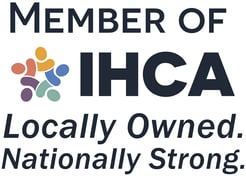As seniors age, many discover that simple activities and tasks, such as driving to the grocery store, have become more difficult. While these new struggles cause frustration and shame, some lost skills can be dangerous to senior health and safety. A term first coined by Dr. Sidney Katz in the 1950s, “Activities of Daily Living,” also called ADLs, are any skills that you need to take care of yourself independently on a daily basis.
For younger people without a disability or injury, you complete activities of daily living mindlessly to start your day. Some of the most common activities of daily living include bathing, dressing and grooming, toileting, eating, and transferring and mobility skills. Many seniors feel embarrassed as they lose these skills, and therefore might not talk about their struggles. What can you do to help your loved one before something serious happens? Watch out for these signs that your loved one needs help with activities of daily living.
Source: Alzheimer’s Association
Bathing
Bathing becomes an issue of both mobility and flexibility as people age. Seniors might not be able to reach certain body parts to wash them. They may also have difficulty getting in and out of their tub. If a senior in your life shows bruising from recent falls, it’s possible that they are having trouble with bathing.
Possible solutions: invest in an accessible bathtub with a door or hire a trained agency to assist with bathing needs!
Dressing and grooming
Like other activities of daily living, dressing and grooming problems are easy to spot if you look for them. A senior may struggle in this area if they forget an article of clothing or wear inappropriate clothes for the weather. Other signs of grooming and hygiene issues include unkempt hair, body odor, unwashed clothing, and bad breath.
Possible solutions: buy clothing that is easier to put on, put a daily checklist on the bathroom mirror, and buy tools like electric toothbrushes to make dental care easier!
Toileting and incontinence
Toileting is a more sensitive activity of daily living for many seniors. However, it remains important for loved ones to look out for signs of incontinence, especially because of the risk of serious infections. Signs of toileting problems may include frequent accidents or urinary tract infections.
Possible solutions: add grab bars in their bathroom and encourage them to eat a healthy diet that protects against UTIs and kidney infections! If problems persist, a caregiver can help make toileting clean and safe.
Feeding
Feeding is the act of daily living that involves bringing food to your mouth and consuming it. For many seniors, arthritis and mobility issues in their hands make it harder to get food to their mouth. Many seniors also struggle to chew solid foods. If you notice that a senior has lost weight or is not eating, find out if they are having trouble feeding themselves!
Possible solutions: find nutritious foods that they can swallow easily or a senior meal service. Trained caregivers can also prepare meals and feed senior clients.
Check out Senior Solutions Nutrition for home-delivered, senior-minded meals!
Transferring and mobility
Transferring and mobility issues include problems with walking and balance, but also trouble with repositioning the body For example, many seniors cannot easily move from the bed to a chair. If you know a senior who has experienced recent falls or who has fresh bruises, they may need help with mobility.
Possible solutions: add other safety measures to their home and work on strength exercises to prevent falls!
Check out our blog: 5 Tips for Preventing Falls for Seniors
Conclusion
Sometimes, it helps to find a service for loved ones who can’t take care of their own activities of daily living. While a whole spectrum of care options exist and some will fit better than others, home care is a great option for seniors who want to stay in their homes. Professionally trained caregivers can assist with all activities of daily living, allowing seniors to go about their daily routines. Are you interested in learning more about how a caregiver can help seniors to thrive in their golden years? Call us today to learn more and check out some of our home care solutions on our website!
- Public Health in the Age of COVID - September 15, 2021
- World Elder Abuse Day June 15, 2021 - June 28, 2021
- World Elder Abuse Day - June 15, 2021



